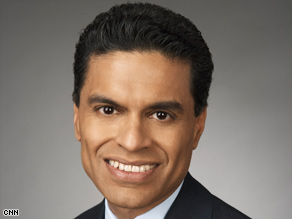
President Obama is halfway through his first 100 days in office and, although he has focused primarily on domestic policy, he also has made a number of foreign policy moves.
NEW YORK (CNN) — President Obama is halfway through his first 100 days in office and, although he has focused primarily on domestic policy, he also has made a number of foreign policy moves. Obama selected Hillary Clinton as secretary of state and she has made several overseas trips. Obama has been graded by critics from the left, right and center. Author and world affairs expert Fareed Zakaria gave his assessment of Obama’s first days to CNN. CNN: What have you thought of President Obama’s first 50 days in office Zakaria: I’m impressed. His administration has been naturally overwhelmed by domestic policy. But despite the enormous space that this rightly occupies, Obama has managed to make a series of moves in foreign policy that improved the way the rest of the world — and notably Arab journalist and politicians — view America. He announced the closure of Guantanamo and the end of any official sanction for torture. He gave his first interview as president to an Arab network and spoke of the importance of respect when dealing with the Muslim world. CNN: When you speak of the administration success are you also referring to Hillary Clinton Zakaria: Yes. Secretary Clinton hit the ground running as secretary of state, racking in more miles in a few weeks than many of her predecessors did in months and mixing her substantive talks with symbolic gestures of outreach to the countries she was in. Overall the administration has signaled a willingness to start engaging with troublesome regimes like Syria and Iran. It ordered a review of Afghanistan policy and said it might work with China on the global economic crisis and energy and environmental issues despite differences on human rights. It has offered the prospect of a more constructive relationship with Russia. CNN: This all sounds good. Why are there still criticisms emerging form the Washington establishment
‘Fareed Zakaria GPS’
Outspoken former U.S. Ambassador Charles Freeman on why he withdrew his name from his new post as chairman of the National Intelligence Council on this week’s “GPS.”
Sunday, 1 & 5 p.m. ET
see full schedule »
Zakaria: Well, the conservative response should have been expected but is almost comical in its fury. The commentator Charles Krauthammer collected together a series of Russian actions and intentions — many of them long in the planning — and decided that they were all “brazen provocations” that Obama failed to counter. Krauthammer goes on to assert this “supine diplomacy” has produced a chain of catastrophes across the globe. The Pakistani government, for example, obviously sensing the weakness in Washington, “capitulated to the Taliban,” in the Swat Valley. Somehow Krauthammer had missed the many such deals that Pakistan had made over the last three years — during the heady years of George Bush — with various elements of the Taliban, deals that were more hastily put together, on worse terms, and with poorer results. CNN: But it’s not all about conservatives weighing in against a Democratic president is it Zakaria: You are correct — the right’s reaction was predictable but many normally sober and intelligent commentators have weighed in as well. Leslie Gelb, the author of a smart new book, “Power Rules,” says that in her comments on China, Hillary Clinton was right, but she shouldn’t have said it publicly. As he says on our show today — Secretary Kissinger often did things in private he would not admit in public. In a sense, duplicity is needed in power politics. There is also a sense that President Obama is indulging in action for the wrong reason. “It’s change for change’s sake,” rues Gelb. CNN: Do you agree with that
Don’t Miss
Zakaria’s book: “The Post-American World”
“Fareed Zakaria: GPS”
Zakaria: No. Do any of these commentators really think the policies of George W. Bush were working so well we should keep them in place And in reality the Obama administration has maintained a number of the Bush policies — in stark contrast to Bush’s own ABC (“Anything But Clinton”) approach when he entered office in 2001. On Iraq, North Korea, Europe, Asia, President Obama has reversed nothing of any importance. He has only begun shifting policy in areas where it has been paralyzed. It turns out that the problem with American foreign policy goes well beyond George Bush. It includes a Washington establishment that has gotten used to the exercise of hegemony and treats as treason any thought of compromise or tradeoffs. It prefers to deal with countries by issuing a series of maximalist demands. These countries can have no interests of their own, so any Russian demands are by definition unacceptable. This is not foreign policy; it’s imperial policy. And it isn’t likely to work in today’s world.